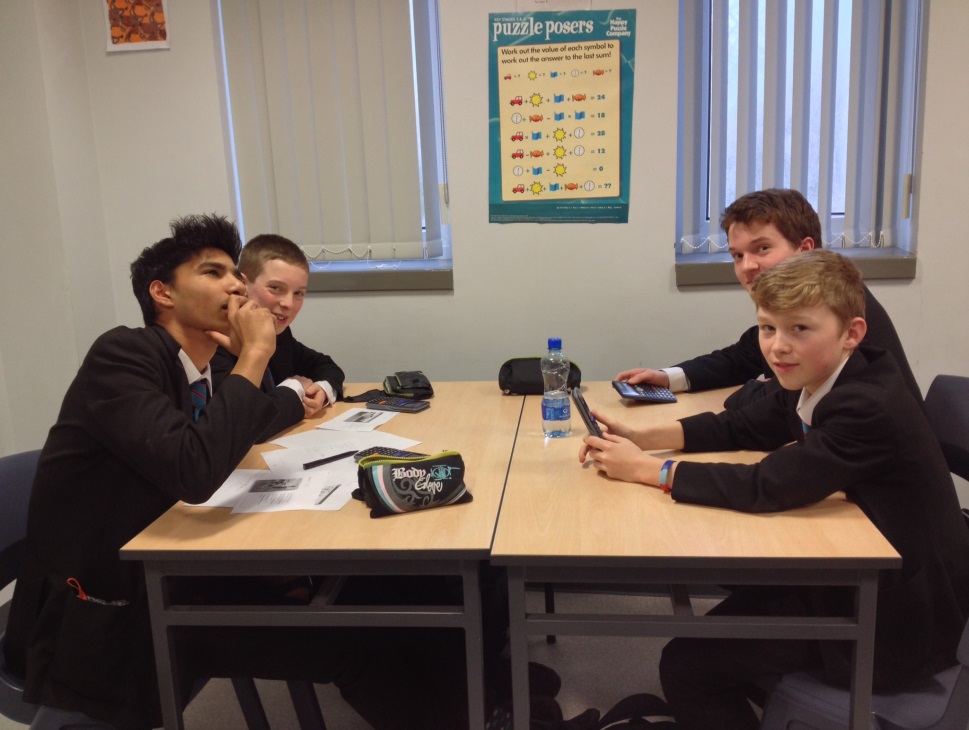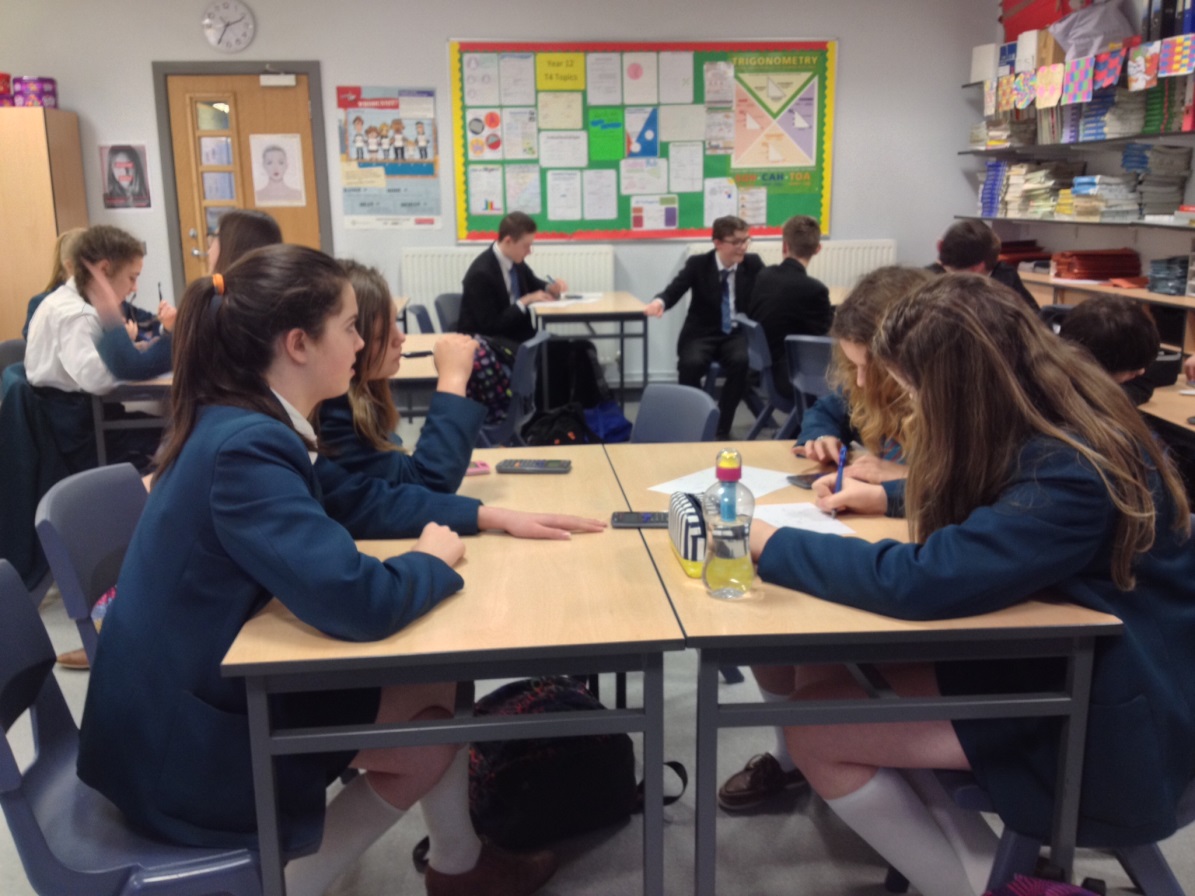Mathematics

Aims And Vision
Mathematics affects every aspect of our lives: wages, phone tariffs, credit cards, statistics we hear in the news, the probability of an event occurring etc. In order to function effectively in modern society it is essential that everyone is competent and confident with the basics of Mathematics.
It is also vitally important for those who want to pursue a career in Engineering, Actuary or Data Analytics.
The vision of this department is not only to provide pupils with the mathematical skills necessary for modern life but also to instil in them an enthusiasm for and enjoyment of Mathematics.
The Mathematics Department seeks to:
– provide a stimulating, safe and happy environment in which pupils and staff can strive to achieve full academic, personal and professional potential;
– ensure each pupil realises their mathematical potential and to assist each pupil to gain any qualification necessary for their chosen career path;
– identify any pupil who has an aptitude for mathematics and develop, stimulate and encourage them to excel in mathematics;
– identify any pupil who is experiencing difficulties in mathematics and provide support and guidance to assist them in gaining a useful qualification in mathematics;
– develop qualities of self-esteem, self-reliance, adaptability and self-discipline in each pupil;
– provide professional development and fulfilment for each member of staff in the department;
Learning

Magazine Article
Banbridge Academy Magazine 2015-2016: Mathematics Article
Key Stage 3
In Key Stage 3, our pupils receive 5 timetabled periods of Mathematics. The classes are taught in their registration groups.
Pupils will follow the Revised Curriculum for Mathematics and Numeracy which includes the element of Financial Capability.
The curriculum covers the areas of Number, Algebra, Shape, Space and Measure as well as Data Handling.
Pupils will have the opportunity to develop:
- Creative thinking in their approach to solving mathematical problems
- Competence in mental mathematics skills
- Competence in pencil and paper methods
- Confidence in the use of mathematical language and notation
- Practical skills using technology
GCSE Mathematics
At GCSE, our pupils receive 6 timetabled periods of Mathematics in Year 11 and 5 periods in Year 12. There are nine classes which are streamed. All pupils are prepared for the CCEA High Level Modular course. The top six classes are entered for Modules M4 and M8, the next two classes are entered for Modules M4 and M7 and one class is entered for M3 and M7. Pupils are given the opportunity to sit module M3 or M4 in January of Year 12. All pupils take module M7 or M8 in May/June of Year 12.
Modules
M3 and M7 covers Grades D, C, B
M4 and M8 covers Grades C, B, A, A*
There is no Controlled Assessment for GCSE Mathematics.
GCSE Further Mathematics
Pupils who are good at Maths and who enjoy Maths have the opportunity to take GCSE Further Mathematics. It is a totally distinct subject from GCSE Mathematics. Topics encountered in GCSE Mathematics, such as trigonometry, are studied in greater depth. Also new ideas and topics, such as differentiation and integration are introduced. GCSE Further Mathematics provides an excellent platform for studying A Level Mathematics.
Students will have the same teacher as they have for GCSE Mathematics. They will have 4 periods in Year 11 and 5 periods in Year 12.
The subject is enjoyable but demanding, requiring commitment and good concentration.
The course consists of 3 branches of Mathematics:-
- Pure Mathematics – includes Algebra, Trigonometry and Calculus
- Mechanics – includes Vectors, Forces and Equations of Motion
- Statistics – includes Probability, Averages and Measures of Spread
There are 2 written papers which are taken in May/June of Year 12. There is no Controlled Assessment for GCSE Further Mathematics.
AS/A2 Mathematics
Mathematics is a very popular and useful A level. The subject keeps many avenues and doors open. It assists in the study of other A levels (especially Physics) and encourages rigorous, organised thought.
AS Year
- Students will have 8 periods of teaching a week
- Students will have the same teacher for all modules
- Students will sit both Pure and Applied modules in May/June of Year 13
A2 Year
- Students will have 9 periods of teaching a week
- Students will have the same teacher as Year 13
- Students will sit both Pure and Applied modules in May/June of Year 14
There is no coursework component in A Level maths.
Pure Maths is worth 60% and Applied Maths is worth 40%
Mathematics is useful and beneficial to those thinking of degrees/careers in
- Mathematics
- Physics, Chemistry, Biology
- Medical Sciences
- Engineering
- Computer Science or Software Design
- Actuarial Science
- Accountancy, Finance, Economics or Business
- Data Analytics
For those unsure about their career direction, Mathematics is a good option, as it develops reasoning and problem solving skills and is accepted for most university degree courses.
AS/A2 Further Mathematics
Further Mathematics can only be taken as a fourth subject. It should be considered by students who are genuinely enthusiastic about Mathematics. Topics encountered in A level Mathematics are developed to a greater degree and some new ideas are introduced. Students who have studied Further Mathematics will have a big advantage over others in the first year of most Mathematical, Scientific and Engineering degree courses.
AS Year
- Students study 1 Pure Module, 1 Mechanics Module and 1 Statistics Module
- Students will have 8 periods of teaching a week
- The modules are taught by 3 different teachers
- All 3 modules will be examined at the end of Year 13
A2 Year
- Students study 1 Pure Module, 1 Mechanics Module and 1 Statistics Module
- Students will have 9 periods of teaching a week
- The modules are taught by 3 different teachers
- All 3 modules will be examined at the end of Year 14
There is no coursework component in A Level Further Maths.
Further Mathematics should be considered seriously by those contemplating degrees/careers in
- Mathematics
- Physics
- Engineering
- Computer Science
Any of the above subjects at Oxford or Cambridge.
UKMT Mathematical Challenge
The Mathematics department enters pupils for the UK Mathematical Challenge every year. This is organised by the United Kingdom Mathematics Trust from the School of Mathematics, University of Leeds. The challenges are lively, intriguing multiple choice question papers which are designed to stimulate an interest in mathematics and to develop problem solving skills.
Gold, Silver and Bronze certificates are awarded to the best 40% of national participants. The most successful participants are also invited to enter follow-on rounds or the Maths Olympiad.
There are three levels of challenge:
- Junior for Years 8 and 9
- Intermediate for Years 11 and 12
- Senior for Years 13 and 14.
